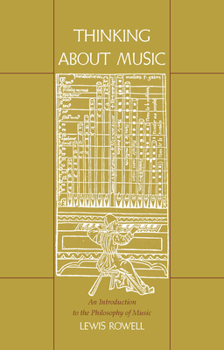Thinking about Music: An Introduction to the Philosophy of Music
Select Format
Select Condition 
Book Overview
Examines the nature of music and traces the history of music philosophy from ancient Greece to the twentieth century. Lewis Rowell's Thinking About Music is more than an introduction to the connections between music and other arts, and the philosophical underpinnings of aesthetics.
Format:Paperback
Language:English
ISBN:0870234617
ISBN13:9780870234613
Release Date:September 1984
Publisher:University of Massachusetts Press
Length:304 Pages
Weight:1.05 lbs.
Dimensions:0.9" x 5.8" x 9.1"
Grade Range:Postsecondary and higher
Customer Reviews
1 rating
A brilliant book about the philosophy of music
Published by Thriftbooks.com User , 15 years ago
It is not often that a book takes one beyond the simple subject matter of music, beyond theory, notation, and harmonization. Lewis Rowell has done just that with his book, Thinking About Music. It certainly is about music, and in an as broadly-defined a scope as is conceivably possible. In some sense, it is a history book. In other ways it is a philosophy book. It is certainly much more than a book of musical theory and harmonization; these items are only briefly touched upon. The book goes deeper in many other areas, and is an exposition presenting information from numerous fields of study, including those of culture, mythology, history, and philosophy. Reading it certainly makes one think about music in new ways. Music should either be left alone to exist on its own for our enjoyment, or else it should be studied thoroughly. Rowell chose the latter. The very title itself only hints at what the book contains. The word thinking indicates that a process is in effect with the intellect being focused. Thinking is an active verb, and represents exactly what we are doing when reading the book. Although the subtitle identifies it as an introduction to the philosophy of music, it is certainly much more. Art and drama are included where appropriate to show how other aspects of culture are intertwined with musical traditions. The ordering of the book's chapters takes us from ancient times to the present, ending with a chapter that encourages us to speculate on what music might become if we allow the expression of music in the broadest possible sense, and without restrictions of any kind. Rowell points out that defining music is inherently difficult since the subject matter is so diverse. Early definitions of music focused on its origins and effects. Mythology figured prominently in ancient discussions of music. People saw patterns in music that were similar to those observed in nature, such as the repetitiveness of the four seasons, the linearity of a flowing river, and the cyclical process of birth, life, and death of living things. These inanimate and animate processes were often personified through myths. Although mentioned only a couple of times in their respective eponymous chapter, Dionysus and Apollo represent the dichotomous views of ancient Greek mythology. What was important about this chapter was that it showed us the two major ways of viewing the ancient world. Simply put, Dionysus represented all that was ordered, comprehensible and proportionate. In contrast, Apollo symbolized all that was disorganized, irrational and emotional. Rowell insightfully discussed five major categories of myth--those of person, power, transience, harmony, and instrument. Each of these myth categories represents cultural issues in a slightly distinct philosophical way. For example, a myth with a transient theme would present a trial, a crisis, or difficulties for people who try to hold onto, capture, or save music. In myths of transience, music always seems





